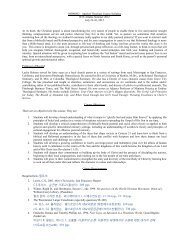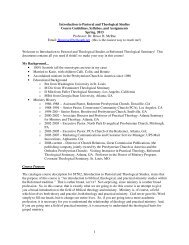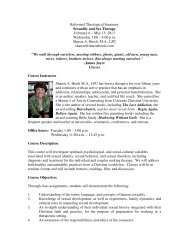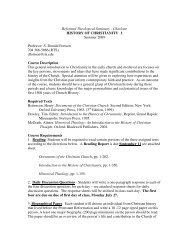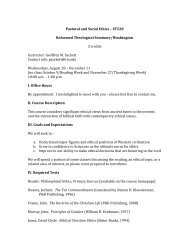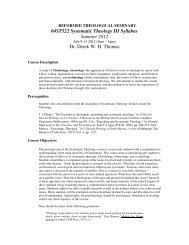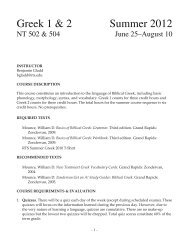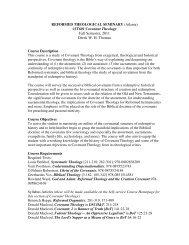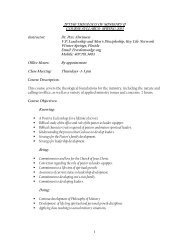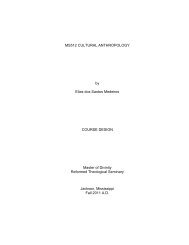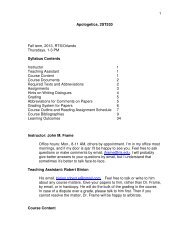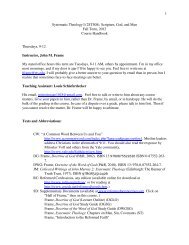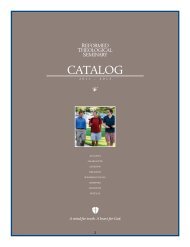spiritual formation for leaders - Reformed Theological Seminary
spiritual formation for leaders - Reformed Theological Seminary
spiritual formation for leaders - Reformed Theological Seminary
Create successful ePaper yourself
Turn your PDF publications into a flip-book with our unique Google optimized e-Paper software.
Course Requirements<br />
Reading Assignments<br />
There will be 2000 pages of new reading (not having been previously read by the student)<br />
assigned <strong>for</strong> the course. The required reading <strong>for</strong> all students is designated on the “Spiritual<br />
Dynamics Reading List” below. If required reading texts cannot be found, the student may<br />
substitute other books from the list. If substitutions must be made, students are to read the<br />
highly recommended books on the reading list. All readings <strong>for</strong> the course must be taken<br />
directly from the list unless otherwise approved by the professor.<br />
Reading Reports<br />
Doctor of Ministry (credit) students are required to report each book, sermon or<br />
article read on the standard “Reading Report” <strong>for</strong>mat available in this course<br />
syllabus. Reading Reports should be submitted on the first day of class, all at once<br />
and be stapled. All reading reports not turned in on the first day of class are to be<br />
turned in with the course integration paper in approximately three months. Students<br />
will receive a grade reduction <strong>for</strong> late Reading Reports unless otherwise approved by<br />
the professor. Non-credit (audit) students do not submit reports.<br />
Class Attendance and Participation<br />
This course follows the lecture, discussion and small group sharing methods<br />
requiring attendance and participation at all classes. Class lectures and group<br />
discussions will be based on the assumption that the student has completed the<br />
assigned readings and assignments given during the course. Occasionally, individual<br />
and small group work sessions will be conducted during class time. Students will be<br />
required to create, present and participate in class presentations.<br />
Post-Class Integration Paper<br />
Students are required to write a 15-20 page (double–spaced, 12 point font) course<br />
integration paper. This paper must reflect new work done by the student as a result of<br />
this course. The paper must demonstrate the student’s theology of Christian growth<br />
and show how the concepts learned in the class lectures AND course readings can be<br />
applied to the student’s personal life and ministry today. The paper must also include<br />
a specific plan <strong>for</strong> the student’s continued growth (<strong>spiritual</strong> <strong><strong>for</strong>mation</strong> plan) and<br />
application of the course concepts to his/her personal life and ministry in the future.<br />
The integration paper is due April 30, 2010 (received hardcopy in D.Min. office)<br />
unless special arrangements have been made with the professor prior to the end of the<br />
class work.



